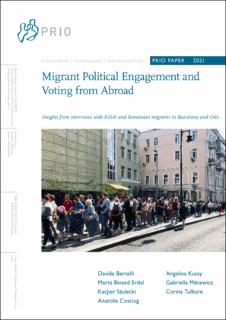| dc.description.abstract | Voting behaviour is not a binary variable in people’s experience: Most migrants have voted, sometimes before migrating and sometimes from abroad. Very few vote always or never.
The political dynamics in both countries of settlement and origin matter, but with considerable variation, not least depending on exposure to and engagement with political developments in each.
Emigrants’ right to vote is contested among diasporas: National belonging from abroad rubs against democratic legitimacy, while possible future return and economic interests also matter.
Access and technicalities impact diaspora voting. Yet technical facilitation is less discussed, and perceived lack of political options to vote for appears to be a larger obstacle to actual voting.
State-led campaigns to mobilise electoral turnout among diasporas mostly go unnoticed. Mobilisation rather happens through personal networks in the diaspora and transnationally.
The impact of migration on migrants’ political views varies. Often previously held views are kept, while some form new opinions on new issues. We saw no shift from right- to left-wing or vice-versa.
Context matters: Living in Barcelona and Oslo as a migrant from Poland or Romania (and from specific regions) has different impacts. Having lived elsewhere before also plays a role.
Voting (or abstaining) may not follow political views entirely. Migrants seek a best-fit among political parties, and voting “here” and “there” may diverge in terms of political views.
Some migrants vote “by proxy”: their vote does not reflect their views, but the views of family or friends in the country of origin. Migrants, as other voters, also engage in tactical voting.
Migrants rarely felt that solutions in Norway or Spain ought to be transposed to Poland or Romania. Differences were seen as too large, and some things were seen as better in the contexts of origin | en_US |
